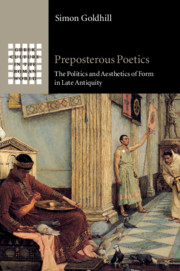Book contents
- Preposterous Poetics
- Greek Culture in the Roman World
- Preposterous Poetics
- Copyright page
- Contents
- Preface
- Acknowledgements
- Chapter 1 Forms of Attention
- Chapter 2 When Size Matters
- Chapter 3 In the Beginning
- Chapter 4 Preposterous Poetics and the Erotics of Death
- Chapter 5 Strange Dogs
- Chapter 6 Life Forms
- Coda
- References
- General Index
- Locorum Index
Chapter 3 - In the Beginning
Published online by Cambridge University Press: 27 August 2020
- Preposterous Poetics
- Greek Culture in the Roman World
- Preposterous Poetics
- Copyright page
- Contents
- Preface
- Acknowledgements
- Chapter 1 Forms of Attention
- Chapter 2 When Size Matters
- Chapter 3 In the Beginning
- Chapter 4 Preposterous Poetics and the Erotics of Death
- Chapter 5 Strange Dogs
- Chapter 6 Life Forms
- Coda
- References
- General Index
- Locorum Index
Summary
First words, we know, matter. The Iliad’s mênin, ‘wrath’, the Odyssey’s andra, ‘man’, set the thematic focus of the narrative to come, the central question of each epic. What is more, the Odyssey’s silence in its opening sentence about the name of its hero and its periphrastic concealment and revelation of its subject is itself programmatic, in its form, for its hero’s performative strategies of deception as well as the narrative’s engagement with the ethics of identity.1 Homer’s beginnings are echoed and transformed throughout Greek writing. Sophocles’ Antigone – tragedy is a machine for rewriting Homer for the fifth-century polis – opens with Ô koinon, ‘O shared’: and the play goes on obsessively to dramatize not just the conflicting claims of commonality in the city and family, but also the dangerous power of the appeals to such commonality.2 Euripides memorably starts his Medea, eith’ ôphelon mê, ‘If only not’, and the play never escapes the lure of the counterfactual narrative, the wishing things were otherwise.
- Type
- Chapter
- Information
- Preposterous PoeticsThe Politics and Aesthetics of Form in Late Antiquity, pp. 71 - 113Publisher: Cambridge University PressPrint publication year: 2020



